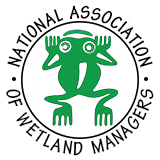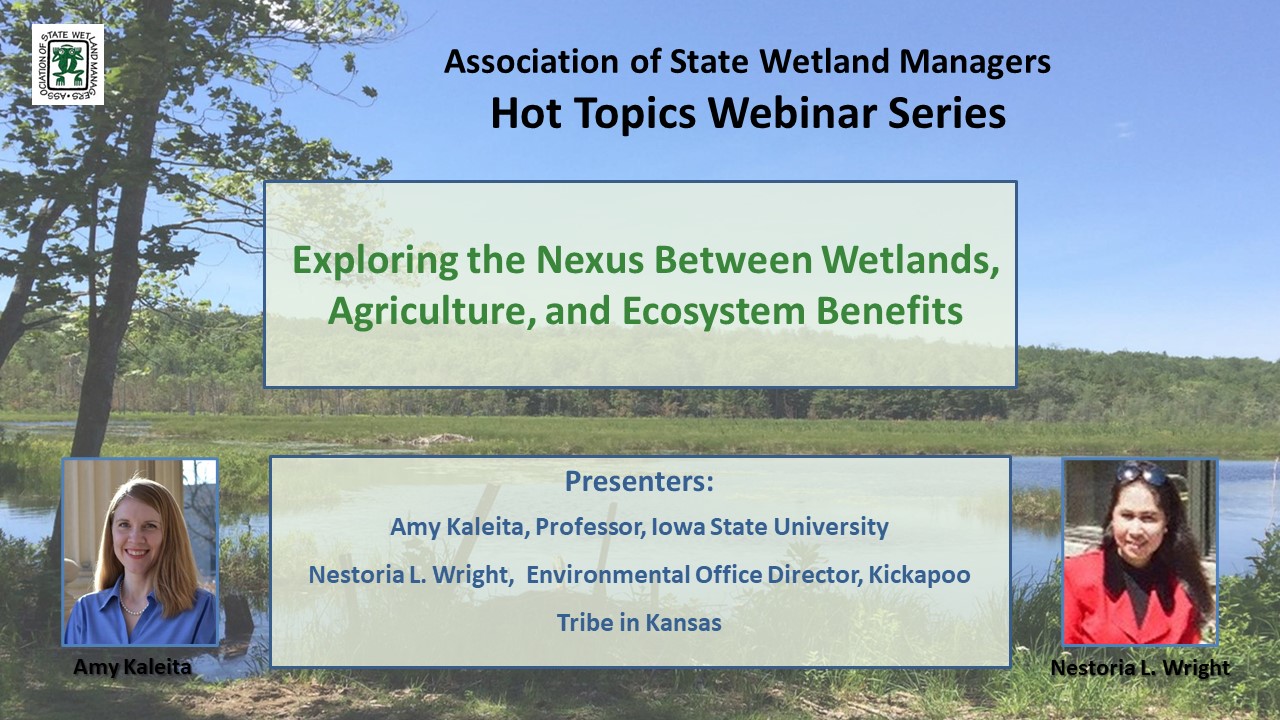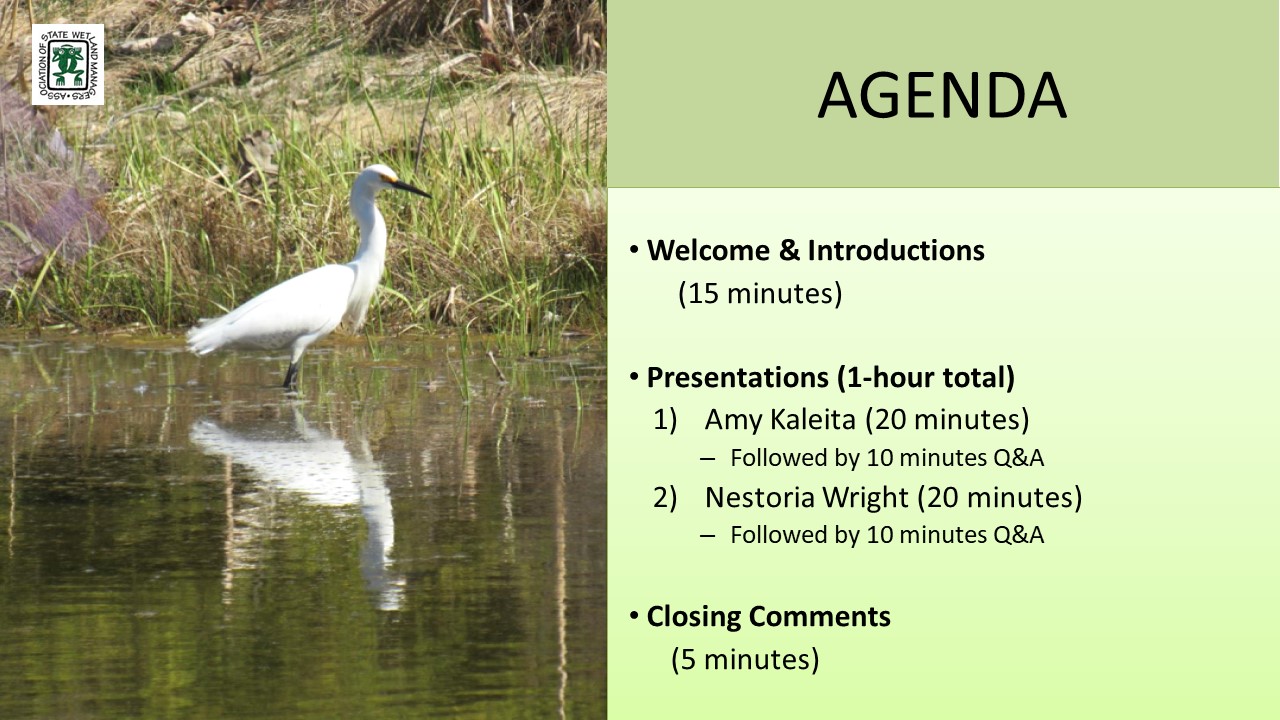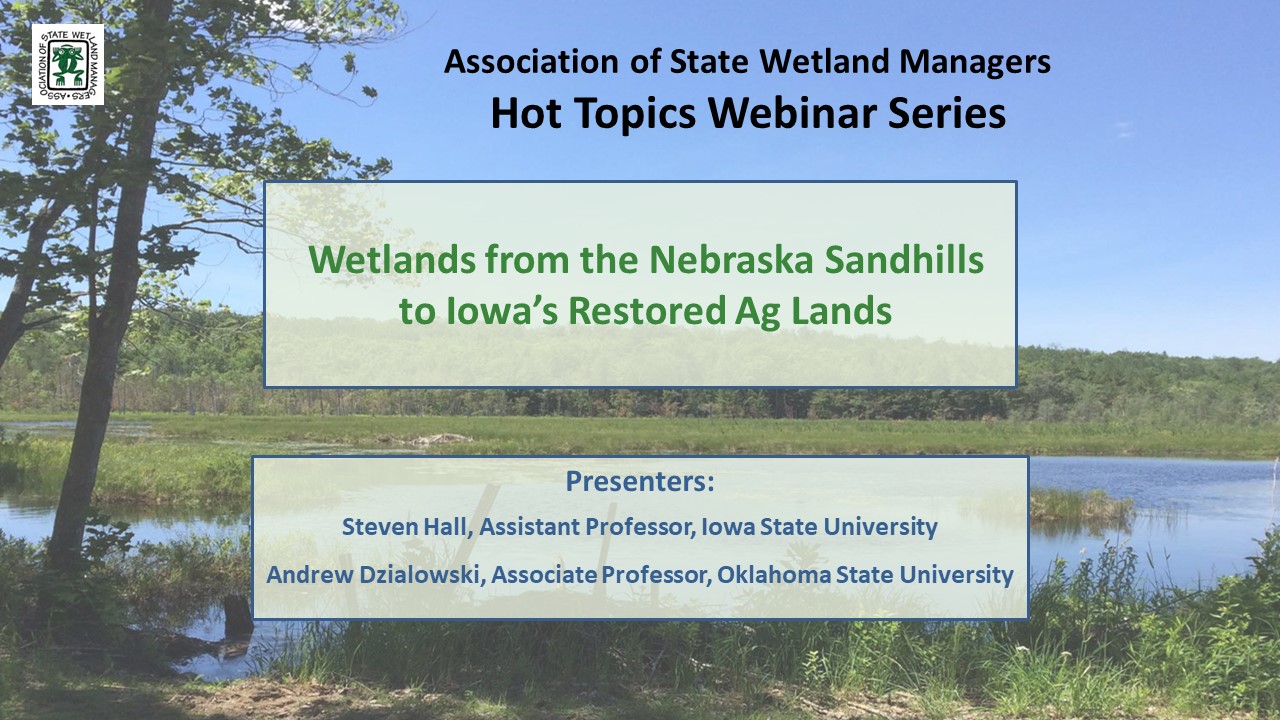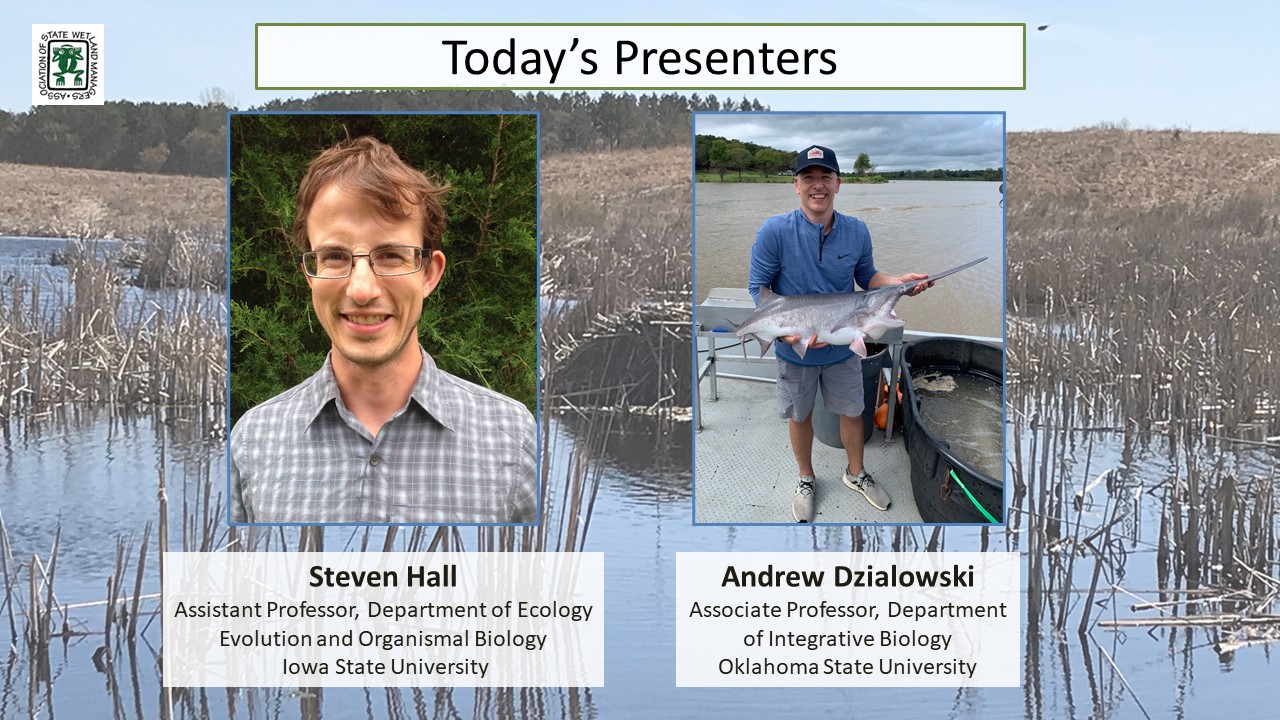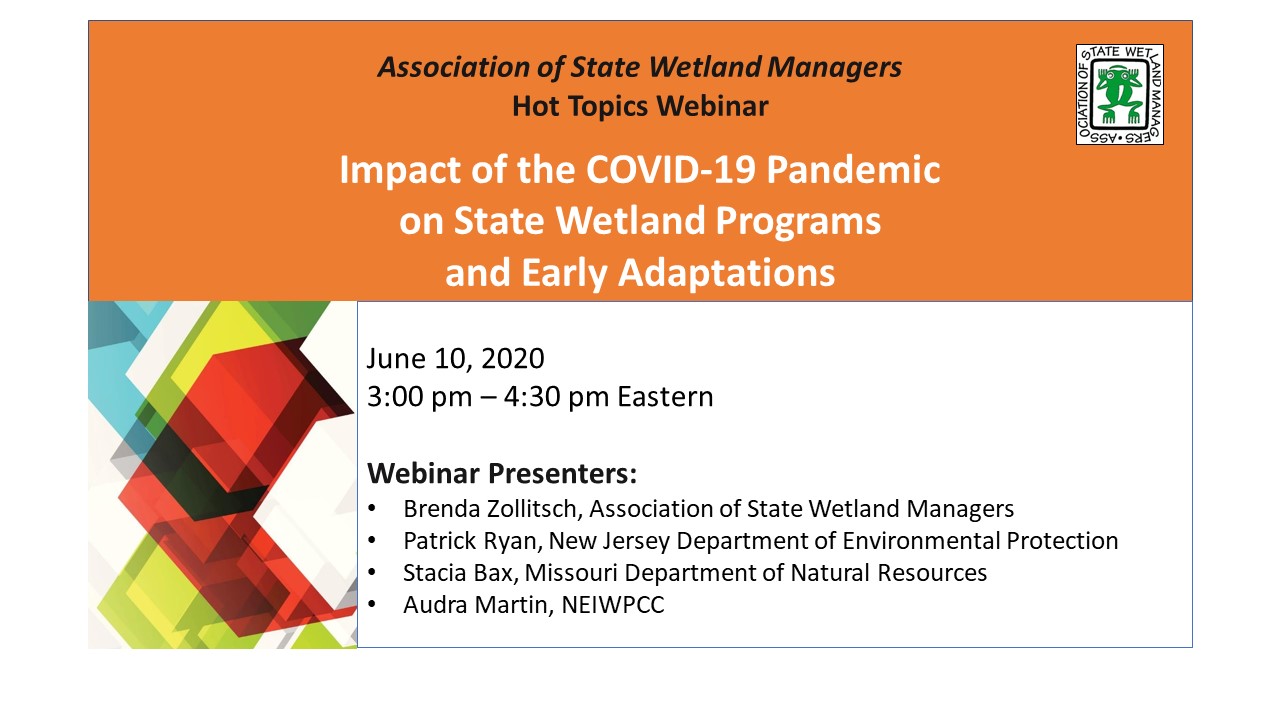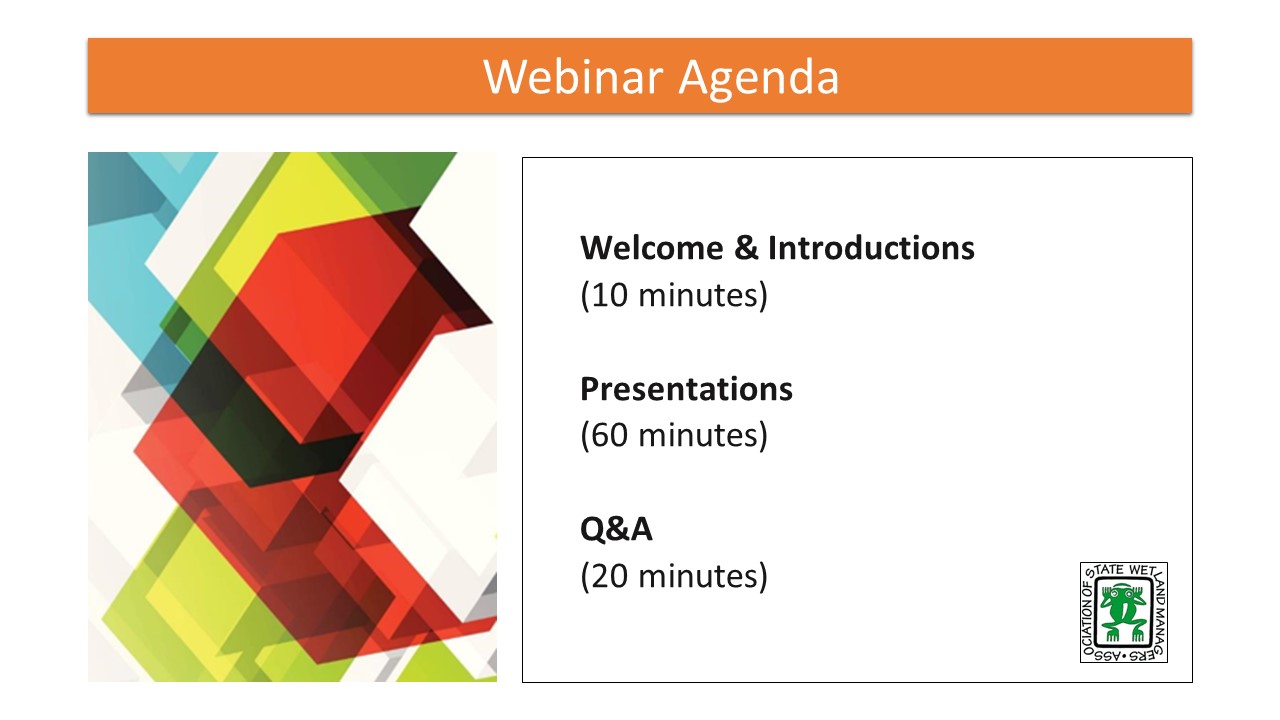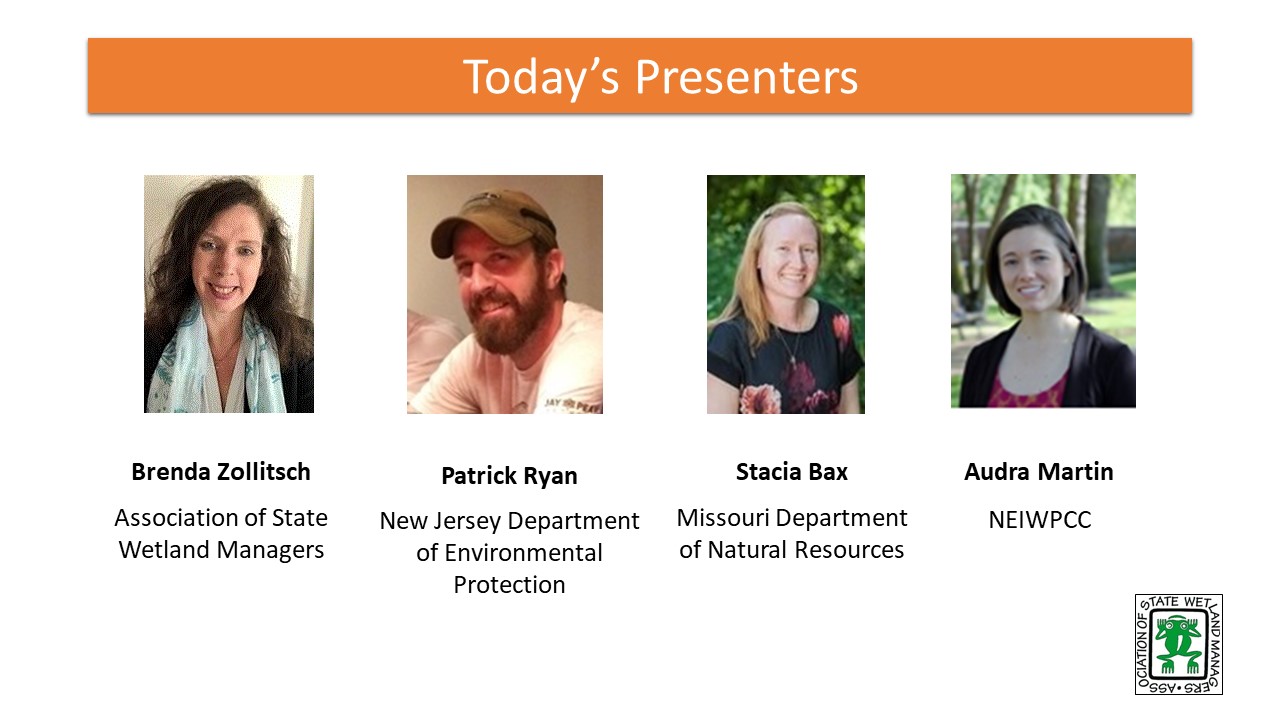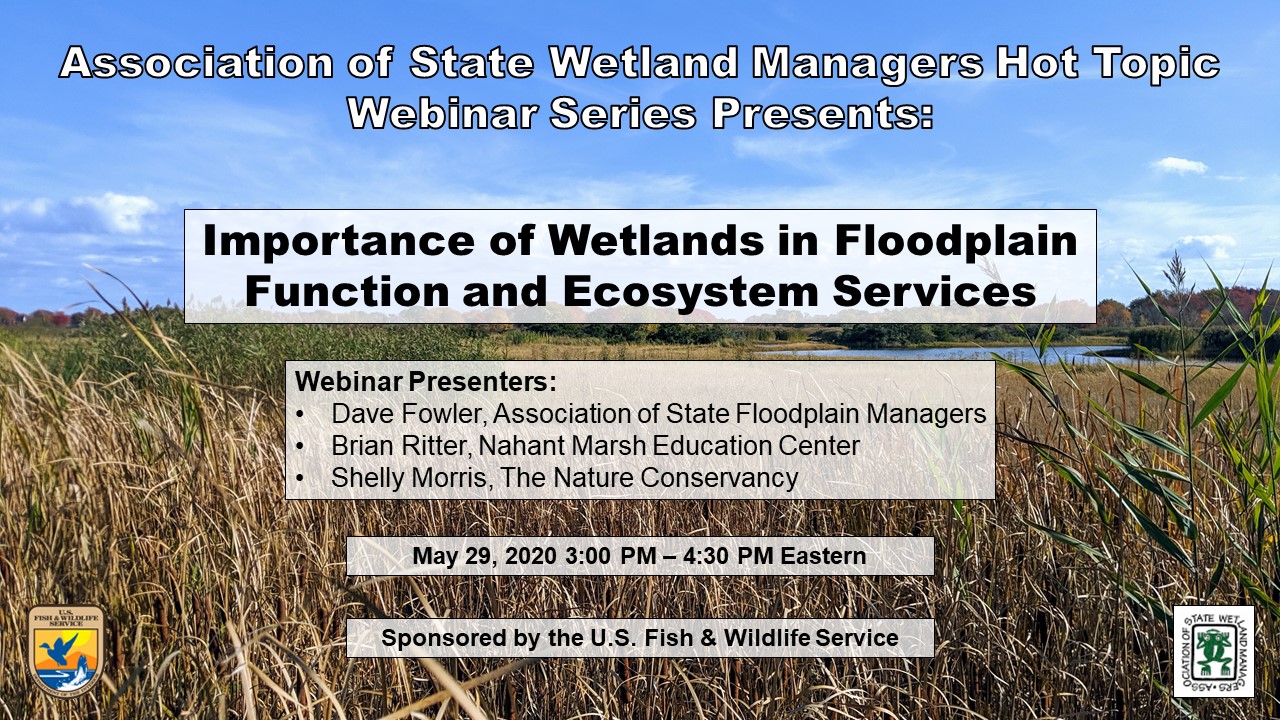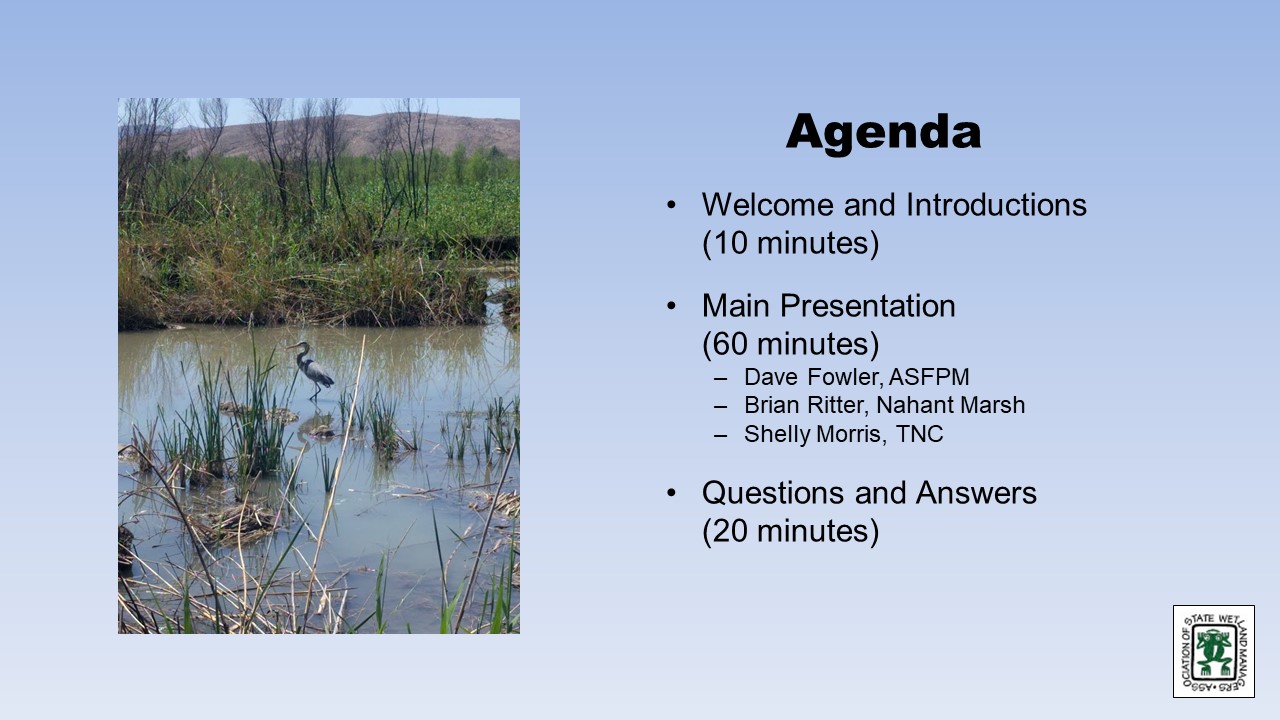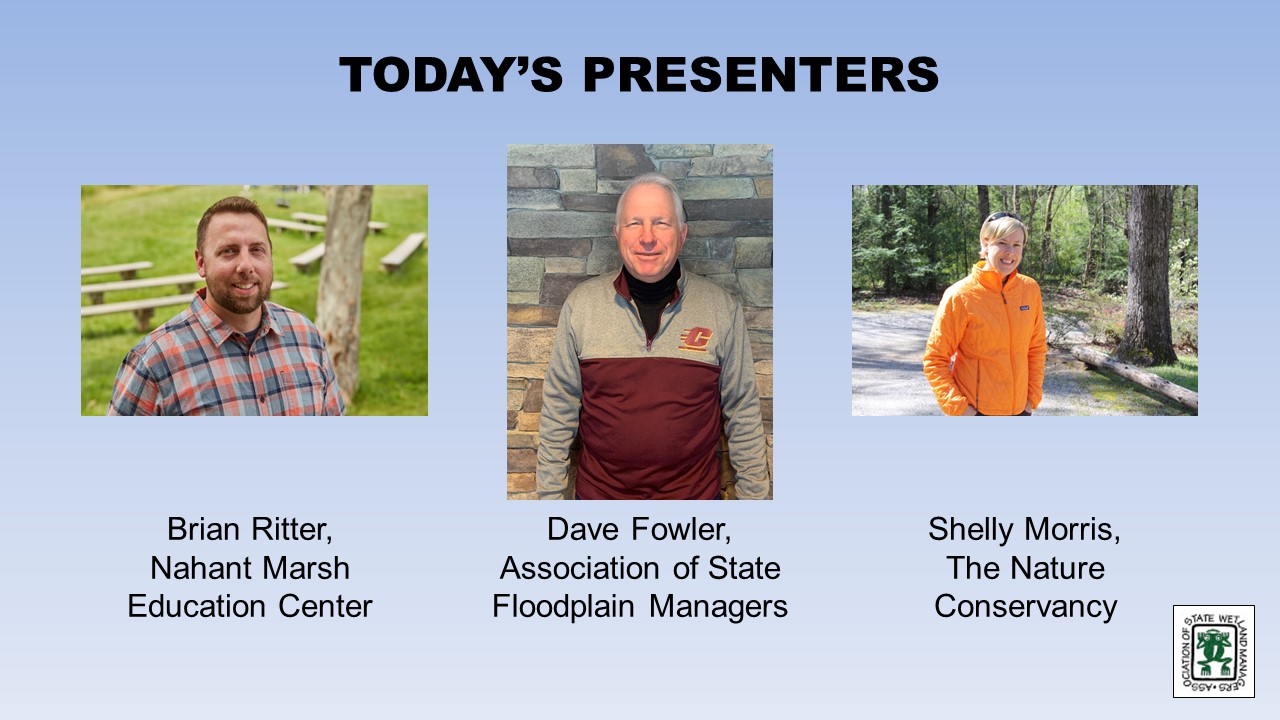Exploring the Nexus Between Wetlands, Agriculture, and Ecosystem Benefits
Held Monday, November 9, 2020 - 2:00 pm-3:30 pm Eastern
INTRODUCTION
- Marla Stelk, Executive Director, Association of State of Wetland Managers [PRESENTATION PDF]
PRESENTERS
- Amy Kaleita, Iowa State University [PRESENTATION PDF]
- Nestoria L. Wright, Kickapoo Tribe in Kansas [PRESENTATION PDF]
DESCRIPTIONS
Amy Kaleita
Farmed prairie potholes: Challenges & Opportunities
Prairie potholes are enclosed depressions with no natural drainage, until a spill point is reached, that retain water for some portion of the year. Forty-four percent of the Des Moines Lobe of Iowa drains to potholes, and they are a common feature in row crop fields. Potholes are a nuisance to farmers because they are usually the last places in the field to dry out, and spring rains can cause ponding which can drown young row crops. Potholes also have water quality implications, due to having higher soil nitrate stocks than uplands, and our work has shown an increase in dissolved reactive phosphorus concentration in potholes over the course of an inundation event.
This project included extensive documentation of the inundation patterns and water quality within several farmed potholes in the Des Moines Lobe. Management alternatives such as conservation tillage, retirement of the pothole, and improving pothole drainage (95-99% of potholes in Iowa are already drained, but may have room for additional capacity) were tested using a small watershed model, which is calibrated to reflect the monitored conditions and then changed to reflect the new management practices. A simple and user-friendly app was created from these modeling results, for individuals to explore the flood risk and management options of their own potholes.
Nestoria L. Wright
Kickapoo Tribe in Kansas CWA Sec.104 (b) (3) Wetland Program Development Project Report 2019
The Kickapoo Tribe Environmental Office (KEO) Wetlands Program monitors and assesses wetlands on tribal and surrounding lands. Information obtained is used to develop and implement plans to improve the quality of these wetlands as well as promote the restoration of historic wetland sites. The Kickapoo Tribe in Kansas Environmental Director and Wetlands Program Coordinator have conducted the 2019 wetland field assessments using the National Wetlands Conditional Assessment methods. They were able to team up with Norman Ecological Consulting to conduct assays of 8 local wetlands including the well-known Mascoutah Marsh as a reference. These field assessments consisted of water, vegetation, and soil collection, not to mention notation of hydrology indicators and buffer characterization. The restoration of these sites is critical considering how important the wetlands are in preventing flooding, improving water quality, providing ecological niches for wildlife, and maintaining the overall health of our ecosystem. Since more than half of the land in Kickapoo Tribe in Kansas is used for agriculture, the wetlands can be utilized to lower harmful effects of insecticides, pesticides, herbicides, and run-off. By completing the 2019 field season they have been able to update the KEO’s wetland records.
Our Specific Goals of Wetland Development Project are to identify and assess the:
- Location, wetland size, type of water body, hydrology, soils
- Land use and impacts on wetland
- Inventory of noxious and invasive weeds, cultural plants, and wetland plants
- Potential wetland functions and values
- Fluctuations in groundwater levels
- Water quality parameters including nutrients & bacteria
BIOS
 Amy Kaleita is a Professor of Agricultural and Biosystems Engineering at Iowa State University. Holding a teaching and research appointment, Kaleita works in the area of information technologies for precision conservation. Her research program includes design of sensing and monitoring systems for farm- and small watershed-scale soil and water data, and utilization of such data in modeling and decision support systems. She has authored or co-authored 42 peer-reviewed journal articles and leads a collaborative research program with more than $7 million in external support. She teaches courses for both engineering and technology students and has received over $4 million in external support for education programs. Kaleita holds a BS degree in Agricultural Engineering from Penn State, an MS in Civil Engineering from the University of Illinois with an emphasis in hydrology, and PhD in Agricultural Engineering from the University of Illinois.
Amy Kaleita is a Professor of Agricultural and Biosystems Engineering at Iowa State University. Holding a teaching and research appointment, Kaleita works in the area of information technologies for precision conservation. Her research program includes design of sensing and monitoring systems for farm- and small watershed-scale soil and water data, and utilization of such data in modeling and decision support systems. She has authored or co-authored 42 peer-reviewed journal articles and leads a collaborative research program with more than $7 million in external support. She teaches courses for both engineering and technology students and has received over $4 million in external support for education programs. Kaleita holds a BS degree in Agricultural Engineering from Penn State, an MS in Civil Engineering from the University of Illinois with an emphasis in hydrology, and PhD in Agricultural Engineering from the University of Illinois.
 Nestoria L. Wright completed her Bachelor of Science in Healthcare Management major in Health Services Organization and Policy (HSOP) and Psychology at Wichita State University, Master’s in public health (MPH) and Community Leadership Development at the University of Kansas and Wichita State University and a Ph.D. Public Health major in Epidemiology, at Walden University. She joined Kickapoo Tribes in Kansas in April 2019. Prior to working at the Kickapoo Tribe EPA, she has been employed at the US Air Force since 2011-February of 2019.She also worked as an Epidemiologist and Health Planner at Shawnee County Health Department Topeka Kansas, where she served as an Emergency Preparedness and Community Outreach Epidemiologist since 2004-2008. Prior to working in the Local and State Health Department as a public health Professional she was teaching Undergraduate Healthcare Administration and Health Promotion courses and presently teaching Masters’ in Public Health Online Courses since 2007 to present. She looks forward to continuing developing and promoting a comprehensive environmental protection programs for the Kickapoo Tribe in Kansas that will protect the natural, cultural, and human resources.
Nestoria L. Wright completed her Bachelor of Science in Healthcare Management major in Health Services Organization and Policy (HSOP) and Psychology at Wichita State University, Master’s in public health (MPH) and Community Leadership Development at the University of Kansas and Wichita State University and a Ph.D. Public Health major in Epidemiology, at Walden University. She joined Kickapoo Tribes in Kansas in April 2019. Prior to working at the Kickapoo Tribe EPA, she has been employed at the US Air Force since 2011-February of 2019.She also worked as an Epidemiologist and Health Planner at Shawnee County Health Department Topeka Kansas, where she served as an Emergency Preparedness and Community Outreach Epidemiologist since 2004-2008. Prior to working in the Local and State Health Department as a public health Professional she was teaching Undergraduate Healthcare Administration and Health Promotion courses and presently teaching Masters’ in Public Health Online Courses since 2007 to present. She looks forward to continuing developing and promoting a comprehensive environmental protection programs for the Kickapoo Tribe in Kansas that will protect the natural, cultural, and human resources.
Please click only once on each video recording to view in this window.
![]()
Wetlands from the Nebraska Sandhills to Iowa’s Restored Ag Lands
Held Monday, September 21, 2020 - 1:00 pm-2:30 pm Eastern
INTRODUCTION
- Marla Stelk, Executive Director, Association of State of Wetland Managers [PRESENTATION PDF]
PRESENTERS
- Steven Hall, Assistant Professor, Department of Ecology, Evolution and Organismal Biology, Iowa State University [PRESENTATION PDF]
- Andrew Dzialowski, Associate Professor, Department of Integrative Biology, Oklahoma State University [PRESENTATION PDF]
DESCRIPTION
The U.S. EPA generously funds multiple wetland research and implementation projects each year, with each EPA Region awarding grants for specific activities in their respective areas. Two awardees from EPA Region 7 (which includes Nebraska, Iowa, Kansas and Missouri) shared the results of their Enhanced State and Tribal Program (ESTP) grants: Steven Hall from the Iowa State University, and Andy Dzialowski from Oklahoma State. Bios and abstracts for both presentations can be found below.
PRESENTERS
- Steven Hall, Assistant Professor, Department of Ecology, Evolution and Organismal Biology, Iowa State University
- Andrew Dzialowski, Associate Professor, Department of Integrative Biology, Oklahoma State University
ABSTRACTS
Steven Hall
Most depressional wetlands in the Des Moines Lobe of Iowa are partially drained and managed for row crop production. These depressions typically have flashy hydroperiods and experience intermittent ponding throughout the growing season, often causing complete crop mortality, and their environmental impacts remain poorly understood. We found that cropped depressions were hotspots of nitrate leaching, yielding 40% higher nitrate (140 kg N ha-1 y-1) than cropped uplands, with higher methane emissions and similar nitrous oxide emissions as cropped uplands. In contrast, restored wetlands with consistently ponded conditions provided substantial net nitrate removal (1600 kg N ha-1 y-1) and similar nitrous oxide emissions as cropped depressions, albeit with greater methane emissions. In sum, cropped depressions are both poor croplands and poor wetlands under present management conditions. Improving the drainage characteristics of cropped depressions while establishing restored wetlands at catchment outlets merits consideration to optimize environmental and agronomic outcomes in these landscapes.
Andy Dzialowski
The Nebraska Sandhills is the largest grass-stabilized dune system in the Western Hemisphere. It contains thousands of wetlands and it has been identified as an ecosystem of major concern. Despite the ecological importance of the Sandhills, very little is known about the abiotic and biotic characteristics of the wetlands in this region. Therefore, we conducted an ecological assessment of Sandhill wetlands to establish baseline conditions, identify indicators that can be used in monitoring programs, and begin to identify reference conditions. We focused on macroinvertebrates because they respond to environmental change, affect wetland function, and provide important nutritional resources for waterbirds in the region. We also sampled permanent waterbodies in the Sandhills to document the impacts of invasive carp on macroinvertebrate communities and to compare macroinvertebrate communities between permanent lakes and wetlands in the region.
BIOS
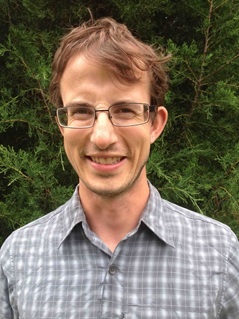 Steven Hall is an Assistant Professor in the Department of Ecology, Evolution, and Organismal Biology at Iowa State University. His researchprogram in biogeochemistry examines the impacts of soil processes on environmental services and impacts, particularly those related to water quality, soil fertility, and climate change.
Steven Hall is an Assistant Professor in the Department of Ecology, Evolution, and Organismal Biology at Iowa State University. His researchprogram in biogeochemistry examines the impacts of soil processes on environmental services and impacts, particularly those related to water quality, soil fertility, and climate change.
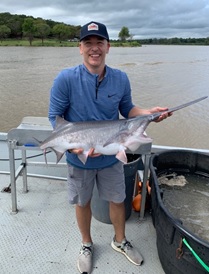 Andrew Dzialowski is an Associate Professor in the Department of Integrative Biology at Oklahoma State University (OSU). He received his PhD in Aquatic Ecology in 2003 from the University of Kansas. His research over the past 12 years at OSU has focused on invasive species, wetland ecology and bioassessment, water quality and reservoir management, and metacommunity ecology.
Andrew Dzialowski is an Associate Professor in the Department of Integrative Biology at Oklahoma State University (OSU). He received his PhD in Aquatic Ecology in 2003 from the University of Kansas. His research over the past 12 years at OSU has focused on invasive species, wetland ecology and bioassessment, water quality and reservoir management, and metacommunity ecology.
Please click only once on each video recording to view in this window.
![]()
Impact of the COVID-19 Pandemic on State Wetland Programs and Early Adaptations
Held Wednesday, June 10, 2020 - 3:00 pm-4:30 pm
INTRODUCTION
- Brenda Zollitsch, Senior Policy Analyst, Association of State of Wetland Managers [PRESENTATION PDF]
PRESENTERS
- Brenda Zollitsch, Association of State of Wetland Managers [PRESENTATION PDF]
- Patrick Ryan, New Jersey Department of Environmental Protection [PRESENTATION PDF]
- Stacia Bax, Missouri Department of Natural Resources [PRESENTATION PDF]
- Audra Martin, NEIWPCC [PRESENTATION PDF]
ABSTRACT
Our world changed overnight with the COVID-19 pandemic. While we all focus on protecting public health, weathering the economic freefall and increasing the country’s medical capacity, every other aspect of business as usual has also been disrupted. Among these disruptions are systems and processes relied on by state and tribal agencies (and their wetland programs). To better understand the current landscape for these programs, the changes that are being made to accommodate health and safety concerns as well as comply with lock-downs and no contact orders, ASWM has been speaking with wetland program staff from around the country. This webinar started with ASWM sharing findings from these discussions. Next, state presenters shared about their experiences adapting in their states, including sharing about official state executive and administrative orders, changes in site inspection and travel protocols, as well as changes to monitoring and assessment activities. The webinar ended with an invitation for state and tribal wetland program staff to participate in information gathering through a new ASWM National Dialogue focused on COVID-19-related issues.
BIOS
 Brenda Zollitsch is Senior Policy Analyst at the Association of State of Wetland Managers. Brenda’s areas of expertise include water resource policy, stormwater management, collaborative environmental policy implementation, and most recently, climate adaptation. At ASWM, Brenda conducts research and policy analysis on wetland and stream issues, manages projects; designs, coordinates and evaluates training for wetland professionals. Brenda is currently leading multi-year national projects on state and tribal wetland regulatory capacity building and Assumption of the Clean Water Act Section 404 Program, as well as many smaller projects. She is currently gathering information about the impacts of COVID-19 pandemic on state and tribal wetland programs, as well as adaptations that these programs are making to function in this next work context. Brenda earned her PhD in Public Policy from the University of Southern Maine and double Master’s degree from Boston University in International Relations and Environmental Resource Management.
Brenda Zollitsch is Senior Policy Analyst at the Association of State of Wetland Managers. Brenda’s areas of expertise include water resource policy, stormwater management, collaborative environmental policy implementation, and most recently, climate adaptation. At ASWM, Brenda conducts research and policy analysis on wetland and stream issues, manages projects; designs, coordinates and evaluates training for wetland professionals. Brenda is currently leading multi-year national projects on state and tribal wetland regulatory capacity building and Assumption of the Clean Water Act Section 404 Program, as well as many smaller projects. She is currently gathering information about the impacts of COVID-19 pandemic on state and tribal wetland programs, as well as adaptations that these programs are making to function in this next work context. Brenda earned her PhD in Public Policy from the University of Southern Maine and double Master’s degree from Boston University in International Relations and Environmental Resource Management.
 Patrick Ryan is an Environmental Supervisor within the Division of Land Use Regulation at the New Jersey Department of Environmental Protection. He supervises a permitting staff responsible for environmental reviews of wetlands, highlands, waterfront, and flood hazard area permit applications for northern New Jersey. Mr. Ryan has a M.S. in Ecology from Penn State University and a B.S. in Natural Resource Management from Cook College, Rutgers University.
Patrick Ryan is an Environmental Supervisor within the Division of Land Use Regulation at the New Jersey Department of Environmental Protection. He supervises a permitting staff responsible for environmental reviews of wetlands, highlands, waterfront, and flood hazard area permit applications for northern New Jersey. Mr. Ryan has a M.S. in Ecology from Penn State University and a B.S. in Natural Resource Management from Cook College, Rutgers University.
 Stacia Bax is the Environmental Manager of the Financial Assistance Center’s Clean Water Section within the Missouri Department of Natural Resources. Stacia has nearly 20 years of experience with the department in various areas related to the water program and state parks, with the 11 years working with Section 401. She recently started a new chapter in her career helping communities finance their wastewater and associated projects as part of Missouri’s Clean Water State Revolving Fund, with hopes to promote wetland and stream restoration where she can.
Stacia Bax is the Environmental Manager of the Financial Assistance Center’s Clean Water Section within the Missouri Department of Natural Resources. Stacia has nearly 20 years of experience with the department in various areas related to the water program and state parks, with the 11 years working with Section 401. She recently started a new chapter in her career helping communities finance their wastewater and associated projects as part of Missouri’s Clean Water State Revolving Fund, with hopes to promote wetland and stream restoration where she can.
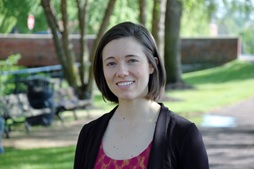 Audra Martin works in the Water Quality Division at NEIWPCC. She coordinates two wetland workgroups, which bring together representatives across the northeast to discuss topics of shared concern, including permitting and regulatory issues and wetlands monitoring and assessment. Audra also serves as a project manager for NEIWPCC’s work to improve the habitat and water quality in Long Island Sound. She holds a Master of Environmental Management degree from Texas Christian University.
Audra Martin works in the Water Quality Division at NEIWPCC. She coordinates two wetland workgroups, which bring together representatives across the northeast to discuss topics of shared concern, including permitting and regulatory issues and wetlands monitoring and assessment. Audra also serves as a project manager for NEIWPCC’s work to improve the habitat and water quality in Long Island Sound. She holds a Master of Environmental Management degree from Texas Christian University.
Please click only once on each video recording to view in this window.
![]()
American Wetlands Month Hot Topics Webinar
Importance of Wetlands in Floodplain Function and Ecosystem Services
Held Friday, May 29, 2020 - 3:00 pm-4:30 pm
SPONSORED BY:
U.S. Fish and Wildlife Service
INTRODUCTION
- William Dooley, Policy Analyst, Association of State of Wetland Managers [PRESENTATION PDF]
PRESENTERS
- Dave Fowler, Association of State Floodplain Managers [PRESENTATION PDF]
- Brian Ritter, Nahant Marsh Education Center [PRESENTATION PDF]
- Shelly Morris, The Nature Conservancy [PRESENTATION PDF]
ABSTRACTS
Presentation by Dave Fowler, Association of State Floodplain Managers
As we move into the new century, we face hard choices concerning our riverine and coastal floodplains. Development along our rivers and coasts with little thought for floodplain functions, cannot continue. People living near water continue to experience ever-increasing flood risks. Management of flood prone areas has for too long been “engineering-centered,” with little consideration to preserving or restoring the natural functions of floodplains for flood management. The gap between flood control and more environmentally sustainable floodplain management must be bridged. This can be accomplished by moving away from attempts to control the water in a watershed or along a coast and moving toward a philosophy which accepts that floods happen and appreciates them as a natural function. We should anticipate the flooding process and plan our development and infrastructure accordingly. Instead of controlling the water, we should control how and where we allow human activities to adversely affect it.
Presentation by Brian Ritter, Nahant Marsh Education Center
Nahant Marsh, located in Davenport, IA is one of the largest remaining urban wetlands on the Upper Mississippi River. Nahant Marsh’s journey from an EPA superfund site to a diverse ecological restoration and active education center, and key aspect of the City of Davenport’s flood plan, will be discussed.
Presentation by Shelly Morris, The Nature Conservancy
Dogtooth Bend (Alexander Co. Illinois) has experienced flooding for decades, and these floods are becoming more frequent, longer in duration, and more unpredictable in timing. Many landowners have expressed an interest in alternatives to farming and are actively looking for financial mechanisms to do so. The Nature Conservancy is working with NRCS and other partners to assist with a path forward, and in 2019 $25M was allocated through NRCS easement programs to purchase easements and restore a large portion of this area. Restoration of this Mississippi River floodplain will provide a variety of ecosystem services as well as financial assistance to interested landowners.
BIOS
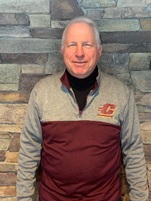 Dave Fowler spent 36 years with the Milwaukee Metropolitan Sewerage District working on a variety of water resource issues. He is most proud of the Flood Management work removing more than 300 residential and commercial structures from the regulatory flood plain, design and construction of eight major flood management projects, restoration and rehabilitation of more than 15 miles of channelized urban streams, and his role in starting the MMSD Green Seams program, a land acquisition program to protect natural flood storage. He retired from the MMSD in May and is currently working at the Association of State Floodplain Managers (ASFPM) as a Senior Project Manager. He has been active with ASFPM for over 20 years and has served in numerous leadership positions. He is a founding member of the Wisconsin ASFPM state chapter. In 2005 Dave was awarded the River Networks “River Hero” Award at their annual conference in Keystone Colorado, and in 2016 he was awarded the Louthain Award for Distinguished Service to ASFPM and the Individual Watershed Award at the Sweet Water Clean Rivers Clean Lakes conference in Milwaukee.
Dave Fowler spent 36 years with the Milwaukee Metropolitan Sewerage District working on a variety of water resource issues. He is most proud of the Flood Management work removing more than 300 residential and commercial structures from the regulatory flood plain, design and construction of eight major flood management projects, restoration and rehabilitation of more than 15 miles of channelized urban streams, and his role in starting the MMSD Green Seams program, a land acquisition program to protect natural flood storage. He retired from the MMSD in May and is currently working at the Association of State Floodplain Managers (ASFPM) as a Senior Project Manager. He has been active with ASFPM for over 20 years and has served in numerous leadership positions. He is a founding member of the Wisconsin ASFPM state chapter. In 2005 Dave was awarded the River Networks “River Hero” Award at their annual conference in Keystone Colorado, and in 2016 he was awarded the Louthain Award for Distinguished Service to ASFPM and the Individual Watershed Award at the Sweet Water Clean Rivers Clean Lakes conference in Milwaukee.
 Brian Ritter is the executive director of Nahant Marsh Education Center and the Program Coordinator and professor for Eastern Iowa Community College’s Conservation Program. He has been serving with Nahant since 2007 and with Eastern Iowa Community Colleges (EICC) since 2002. Brian earned his BS in Psychology with a minor in Biology from St. Ambrose University in Davenport, IA and his MS in Community Health, with an additional 40 graduate hours in Biology from Western Illinois University. Additionally, he has training in wetland delineation, botany, and wildland firefighting. During his tenure at Nahant, he has expanded the education program, established a summer research program, and grown the marsh preserve. In addition, he occasionally serves as a Biology adjunct faculty at St. Ambrose University. During his free time, he works around his small farm, Rockingham Hollow Farm, LLC, where raises organically-grown produce and goats.
Brian Ritter is the executive director of Nahant Marsh Education Center and the Program Coordinator and professor for Eastern Iowa Community College’s Conservation Program. He has been serving with Nahant since 2007 and with Eastern Iowa Community Colleges (EICC) since 2002. Brian earned his BS in Psychology with a minor in Biology from St. Ambrose University in Davenport, IA and his MS in Community Health, with an additional 40 graduate hours in Biology from Western Illinois University. Additionally, he has training in wetland delineation, botany, and wildland firefighting. During his tenure at Nahant, he has expanded the education program, established a summer research program, and grown the marsh preserve. In addition, he occasionally serves as a Biology adjunct faculty at St. Ambrose University. During his free time, he works around his small farm, Rockingham Hollow Farm, LLC, where raises organically-grown produce and goats.
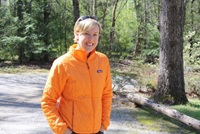 Shelly Morris is the Director of Floodplain Strategies for the Kentucky Chapter of The Nature Conservancy. In addition to working across Kentucky, she also covers floodplain conservation efforts for the Conservancy in western Tennessee and southern Illinois. She convenes a variety of agencies and stakeholders to develop collaborative approaches to advance the pace and scale of floodplain restoration and protection. Prior to joining the Conservancy in 2003, she received a BS in Biology from Murray State University and a MS in Biology from University of Louisville.
Shelly Morris is the Director of Floodplain Strategies for the Kentucky Chapter of The Nature Conservancy. In addition to working across Kentucky, she also covers floodplain conservation efforts for the Conservancy in western Tennessee and southern Illinois. She convenes a variety of agencies and stakeholders to develop collaborative approaches to advance the pace and scale of floodplain restoration and protection. Prior to joining the Conservancy in 2003, she received a BS in Biology from Murray State University and a MS in Biology from University of Louisville.
Please click only once on each video recording to view in this window.
![]()
PDF List of Past Hot Topics Webinar Recordings
View Upcoming Hot Topics Webinars
